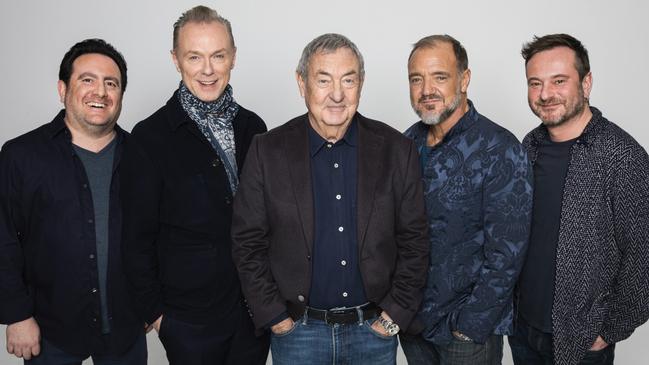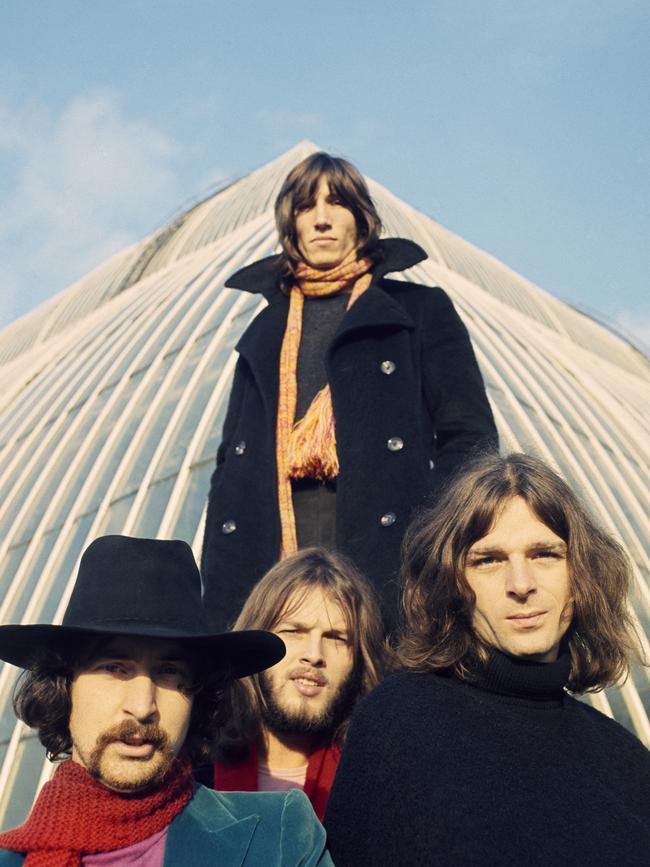Nick Mason on the future of Pink Floyd, 50 years of Dark Side of the Moon and his new retro tour
The legendary drummer opens up about his “dearest – and most difficult – friends” as he readies for an Aussie tour.

SmartDaily
Don't miss out on the headlines from SmartDaily. Followed categories will be added to My News.
The Dark Side of the Moon – Pink Floyd’s revered rock masterpiece that has become one of the best-selling albums ever – turned 50 this month.
But any fans hoping that the milestone might bring some kind of miraculous rapprochement that would see surviving members Roger Waters, David Gilmour and Nick Mason on the same stage again might want to face up to reality.
“Getting both of them on stage at once?” ponders drummer Mason, often described as the heartbeat of the band and the only member of Pink Floyd who has played on every album, “Hmmm … tricky.”
Founding member and bassist Waters and guitar guru Gilmour have been taking potshots at each other for decades over the legacy and line-up of Pink Floyd, who also released Wish You Were Here, Animals and The Wall in a spectacularly successful run in the 1970s.
Internal conflict led to Waters leaving in 1985 for a solo career, and he was infuriated when Gilmour, Mason and the late keyboardist Rick Wright carried on without him, releasing a further three albums.
With a few brief moments of peace – such as when they played Live 8 together – they have been feuding ever since but things seem to have reached a nadir last month.

Waters’ ongoing negative comments about Israel and his position on Ukraine (he addressed the UN at Russia’s invitation calling for a ceasefire) prompted Gilmour’s wife Polly Sampson to accuse him on Twitter of being anti-Semitic as well as being a “Putin apologist and a lying, thieving, hypocritical, tax-avoiding, lip-synching, misogynistic, sick-with-envy, megalomaniac”.
Gilmore later retweeted it, saying he endorsed every word of the spray, with Waters responding that refuted the comments entirely and he was considering his position.
Mason, so long the conduit between the two, gives a hollow laugh when asked to describe the intra-band relationships right now, as the discussions continue for the possible sale of the Pink Floyd catalogue, reportedly for around $750 million.
“I think I would have to ask someone more experienced in the diplomatic world,” he says, wryly.
“Mixed … I think would be the best way of putting it. Not great, but you never know. Roger can be a very difficult person, I’m told. I met Roger in 1962 when we started as architectural students so he is one of my oldest, dearest – and most difficult – friends.”
He does, however, speak up for his long-time friend on the cancellation by German authorities of some shows in his current This Is Not a Drill tour.
In response, Waters railed against cancel culture and threatened legal action, saying the ban was unconstitutional and infringed on his freedom of speech.

“I would always take the side of the artist rather than some sort of government decree and I think Roger is sometimes misunderstood in some of the points he tries to make,” Mason says.
“We are obviously miles apart on something like Ukraine, particularly given that David has a Ukrainian daughter-in-law – it was inevitable that lines were going be drawn there. I think shutting down voices in general is not a good idea. I am in favour of free speech.”
To further illustrate the rift, there is an ‘official’ 50th anniversary edition of The Dark Side of the Moon in the pipeline, as well as a version re-recorded version from Waters, without his former bandmates.
Mason, who never expected to be talking about it half a century later – “the idea of longevity wasn’t really part of the rock and roll story” – says there is room for both and that in the absence of new or previously unreleased material, reinterpretation is the key.
It’s one of the reasons for his latest project, Nick Mason’s Saucerful of Secrets, which is the brainchild of former Blockheads guitarist Lee Harris and also features Spandau Ballet’s Gary Kemp, keyboardist Dom Beken from The Orb, and Guy Pratt, who was Pink Floyd’s touring bass player for decades.
The idea beyond the group, which formed in 2018 and has toured Europe and the US to rave reviews, is to celebrate the seven Pink Floyd albums before The Dark Side of the Moon, including the work of founding member and former front man, the mercurial Syd Barrett.

Mason says he was hesitant at first – he wasn’t even sure if he could still play drums after 20 years of “loafing about” – until he realised how much he’d missed playing live.
And after all the dramas of the ongoing Pink Floyd saga, he was delighted with how seamless and joyous the exercise of resurrecting deep and rarely performed cuts from early albums including the band’s debut The Piper At the Gates of Dawn and the increasingly ambitious releases such as Ummagumma, Atom Heart Mother and Meddle.
“That was the surprise,” he says.
“It was the fact that everyone was really keen to make this happen. We booked a rehearsal room really to find out whether it would work or not and it was amazing how quickly it all jelled together with everyone finding the part they wanted to play and how easy it was so agree on what the repertoire should be. It was the very best of the early years – that sense of everyone singing from the same hymn sheet.”
Playing smaller venues – the first gig was in a pub before they graduated to theatres – also brought back an immediacy and level of connection that Mason thought he had left behind once Pink Floyd became one of the biggest stadium acts in the world.
“One of the great things about playing small gigs is that you get a really strong sense of everyone being there for the same reason,” he says.
“The one problem of doing stadiums … is that you might get 70 per cent of the audience but the other 30 per cent are playing frisbee or doing drugs at the back and not 100 per cent paying attention. Indeed it was that sort of attitude that led to Roger writing The Wall.”

Playing early singles such as Arnold Layne and See Emily Play also brought back memories of Barrett, who Mason describes as “the most delightful friendly character who just sort of faded away”.
Barrett left the band in 1967 as drug use and mental health issues took their toll and Mason says that to this say he and his bandmates regret they had not done more to help him.
“We did our best given the time,” he says. “You look back now and it was ludicrous. If Syd was going through a particularly bad patch, our idea of remedial action was to take one day off. So, inevitably, there’s a little bit of guilt there, I think for all of us, but we just didn’t know any better.”
As for one last hurrah for Pink Floyd, Mason says he’d love to play with his former comrades again but can’t see it happening any time soon.
Even the resolution of the band’s back catalogue seems intractable at the moment, but he lives in hope.
“It’s being discussed at considerable length,” he says.
“It seems all wrong in some ways to relinquish all control of something that has been dear to us for 57 years. On the other hand, none of us are getting younger and it might be a very simple way, in my case, of not leaving a battlefield for my kids to have to deal with and to do some sort of clean break and move on. But there isn’t very much progress on that at the moment.”
Nick Mason’s Saucerful of Secrets, Forum Theatre, Melbourne, September 16; Brisbane Convention Exhibition Centre, September 19; Enmore Theatre, Sydney, September 21, Riverside Theatre, Perth, September 25. Ticket on sale 10 Wednesday tegdainty.com
More Coverage
Originally published as Nick Mason on the future of Pink Floyd, 50 years of Dark Side of the Moon and his new retro tour




